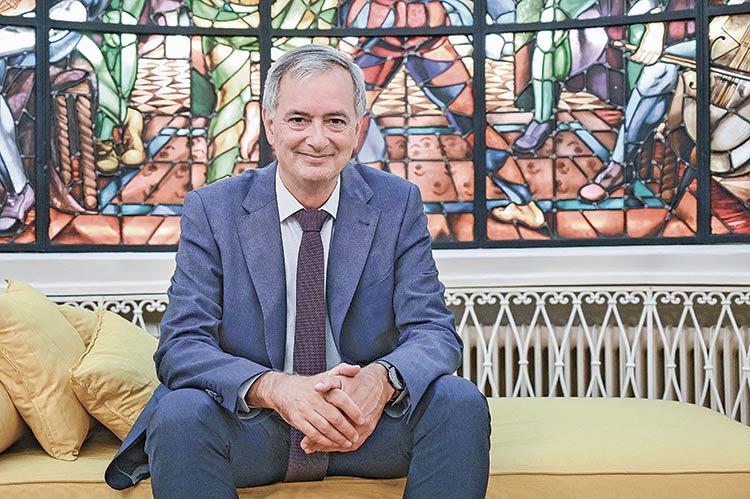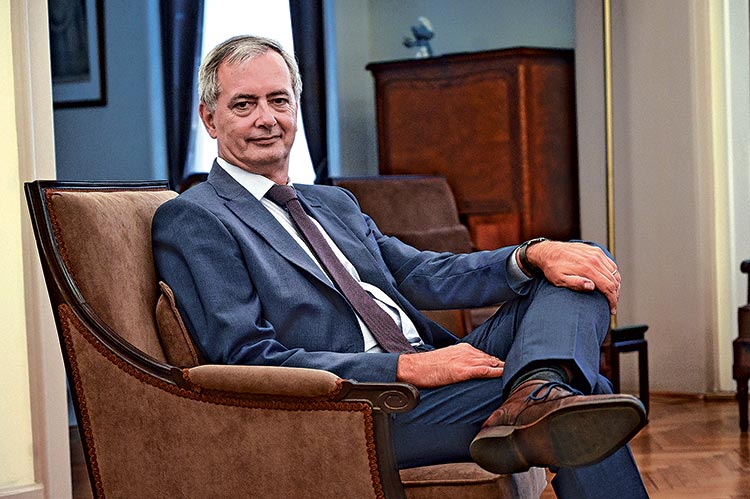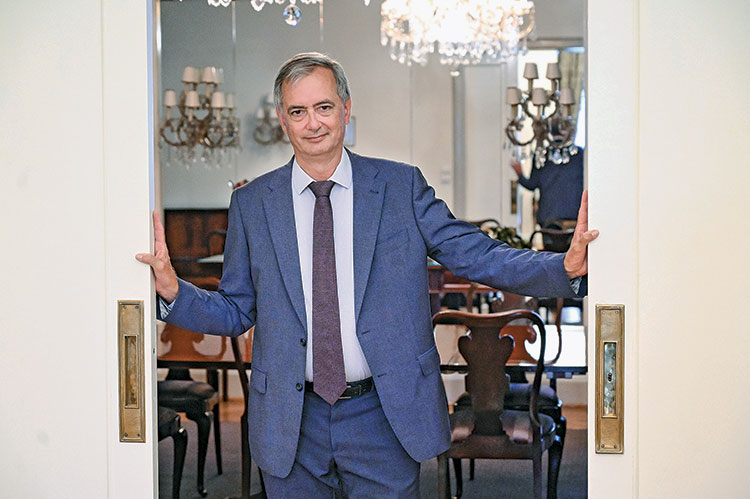The speed of EU accession is determined by the candidate-country and, in particular, by the quality and pace of the implementation of initiated reforms. In that regard, we are looking to see tangible results and improvements in the media sphere, judicial reform to ensure an independent judiciary and the fight against corruption and organised crime ~ Adam Koenraad
Despite the blockades and challenges imposed by the COVID-19 pandemic, trade between Belgium and Serbia has been rising steadily, bringing good news to Belgian Ambassador Adam Koenraad.
In this interview for CorD Magazine, Ambassador Koenraad explains, among other things, why Belgium has opted to side with the group of EU member states that have taken the stance that no new accession negotiation chapters should be opened with Serbia, despite the support that his country generally gives to this process.
Your excellency, the eve of this summer’s Belgian National Day was marked by a National Day of Mourning for the victims of the flooding that hit your country. How is the recovery from the damage caused by the floods progressing?
Unfortunately, the consequences of the floods have been devastating. A total of 41 people lost their lives and many more have lost their houses and belongings. The damage is extraordinary and will take a long time to repair. I have been very touched by the many words of true sympathy received here in Serbia, and the Serbian Government’s offer to send assistance. In the past, Serbia has endured similar awful experiences and this may explain your sensitivity to these events happening elsewhere. We are grateful for these tokens of solidarity and humanity.
For the second year, your term in Serbia has been marked by the COVID-19 Pandemic. How much has the global shutdown impacted on the quality of your cooperation with partners in Serbia?
The first months of the pandemic were, of course, a shock to the system. At a moment when international cooperation was needed the most (e.g., evacuations of our citizens), we had to adjust our traditional ways of working in swift and unprecedented ways. However, I do feel that, after those first months, we have managed, at least professionally, to adjust quite well to this new reality.
Video calls cannot replace real people-to-people contacts in the long term, but technology helped us a lot. As the pandemic entered into its second year, and especially after the roll-out of the vaccination campaign here in Serbia, we were able to slowly but surely relaunch normal Embassy activities, including essential cooperation with our Serbian partners. We count ourselves lucky that this has been possible so quickly.
I do hope we will be able to see a wider spectrum of political parties participating in the next election in Serbia. And, yes, it is absolutely necessary that politicians show respectful behaviour and use a positive narrative. Debates should not degenerate into slander or personal attacks, but rather should focus on ideas and programmes
In the CorD Magazine interview that you gave prior to the pandemic, you spoke about the significant strengthening of economic cooperation between Belgium and Serbia. Has the pandemic led to a slowdown in this trend?
No, quite the contrary. The trade numbers for 2020 between Belgium and Serbia have been less impacted by the pandemic than in other countries. Trade between our two countries has been experiencing a steady rise for years and we have no reason to expect anything less for this year. As for Belgian companies in Serbia: yes, 2020 was a difficult year, but they have all managed to overcome the lockdowns and continue working and even making investment plans. I am proud to say that several of our companies have also shown their solidarity with the Serbian people through donations of medical equipment and protective material. I would say that Belgian business in Serbia are looking to the future with a sense of optimism and confidence.

Whilst you’ve been in Serbia, you’ve always relayed a message of support for the country’s European integration. However, in June Belgium joined the group of EU member states that have taken the stance that no new accession negotiation chapters, or clusters, should be opened with Serbia. What are the key reasons for taking this position?
You are right, Belgium has always been, and remains, a supporter of the enlargement process. We believe the Western Balkans belong in the European Union and are convinced that, in just a few decades, the enlargement process has been able to transform our continent for the better. However, we also believe strongly that the enlargement process should be merit-based. The speed of the accession is determined by the candidate-country, and in particular by the quality and pace of the implementation of reforms undertaken. In that regard, we are looking to see tangible results and improvements in the media sphere, judicial reform to ensure an independent judiciary and the fight against corruption and organised crime. The annual progress report of the European Commission should be as much of a guidebook for each candidate-country as it is for Belgium to assess the progress made.
It is difficult to predict what will happen in Afghanistan, but it is in the interests of Europe to have stable, prosperous neighbours. We should also not forget that most people fleeing their country have not travelled to Europe, but have been received by neighbouring countries in the region itself, with the support of the EU
In your previous interview for our magazine, during the build-up to the 2020 parliamentary elections, you recommended a “less aggressive and confrontational style of political discourse”. Now a new cycle of the interparty dialogue on fair election conditions is underway. Do you believe it will be possible for an agreement to be reached?
I am convinced it is possible. I am pleased to see the efforts made by the Members of the European Parliament to mediate between the ruling parties and the opposition parties, and I sincerely hope that a good result will come from the talks in September. A democracy can only thrive if there is divergence of opinion and if those different opinions are represented in the parliament. If they are not, the system can become stale, lacking in fresh ideas and less accountable to the people. I do hope we will be able to see a wider spectrum of political parties participating in the next election in Serbia. And, yes, it is absolutely necessary that politicians show respectful behaviour and use a positive narrative. Debates should not degenerate in slander or personal attacks, but rather should focus on ideas and programmes.

How do you view the media scene in Serbia?
In past months, laudable efforts have been made by the Serbian Government to adopt a media strategy and associated action plan. Initial steps in the implementation were undertaken. However, there were also instances where the action plan was not used and critical media were attacked. Some key issues mentioned in the last EU Progress Report also remain unaddressed. Transparency of media ownership and the allocation of public funds, especially at the local level, has yet to be established. I would also advocate for more pluralism in the media: for different voices on TV channels and other media outlets with national coverage. This is particularly important in view of the upcoming electoral campaign.
Reacting to the latest crisis following a change of government, Belgium immediately joined efforts to evacuate people from Afghanistan. Do you think Europe should expect a new wave of migrants?
During past years, we have unfortunately seen that conflict and instability in the European neighbourhood leads to people having to flee their homes and leave behind their livelihoods. This is first and foremost a humanitarian tragedy. It is difficult to predict what will happen in Afghanistan, but it is in the interests of Europe to have stable, prosperous neighbours. We should also not forget that most people fleeing their country have not travelled to Europe, but have been received by neighbouring countries in the region itself, with the support of the EU.
During the three years that I’ve been here, I’ve visited several reception and asylum centres: from those in the very south of Serbia, in Preševo and Bujanovac, to the Krnjača Asylum Centre near Pančevo. Serbia’s policy towards refugees has been generous and well-organised, and the country welcomed many refugees with the support of UNHCR and the EU
Media outlets across the region have reported on former U.S. Secretary of State Madeleine Albright’s statement that she expects the countries of the Western Balkans to accept refugees from Afghanistan. Given that you’ve had the opportunity to familiarise yourself with the situation in this region, do you think that the arrival of refugees could destabilise the region?
I do not think so. During the three years that I’ve been here, I’ve visited several reception and asylum centres: from those in the very south of Serbia, in Preševo and Bujanovac, to the Krnjača Asylum Centre near Pančevo. Serbia’s policy towards refugees has been generous and well-organised, and the country welcomed many refugees with the support of UNHCR and the EU. I was always impressed by the dedication of the staff of the Commissariat for Refugees and Migration to guarantee adequate shelter for all those people.

Has the Belgian government already decided whether to accept refugees from Afghanistan and, if so, how many of them can count on being welcomed into your country?
Currently, Belgium, like many other countries, is working non-stop to evacuate from Afghanistan Belgian citizens, but also Afghan nationals who have ties to Belgium. These ties could mean: Afghan partners of Belgian nationals, children with a Belgian parent, interpreters that assisted our military in Afghanistan, collaborators of Belgian women’s organisations in Afghanistan.
We are talking about many hundreds of people. For now, our focus is on concluding this operation successfully. We will assess the situation and look at what is possible in terms of reception capacity, but it is obvious that Belgium will not shy away from its responsibilities in this respect.
| BUSINESS I would say that Belgian businesses in Serbia are looking to the future with optimism and confidence | DEMOCRACY A democracy can only thrive if there is divergence of opinion and if those different opinions are represented in the parliament | MEDIA I would also advocate for more pluralism in the media: for different voices on TV channels and other media outlets with national coverage |
|---|